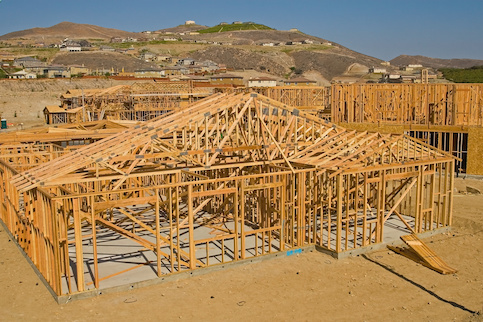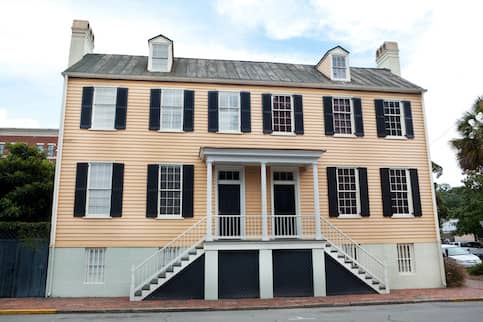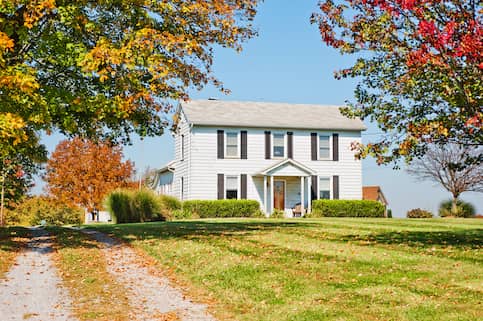For many homeowners, home loans from the Federal Housing Administration (FHA) make homeownership attainable and affordable. This type of home loan has less stringent requirements than conventional loans. But while the requirements are more flexible, FHA mortgages still have requirements home buyers must meet, including paying closing costs.
If you’re considering an FHA loan to purchase a home, you should acquaint yourself with the rules around closing costs. Let’s take a closer look at FHA loan closing costs and everything they include.
What Are Closing Costs On An FHA Loan?
Closing costs are administrative and service fees a home buyer must pay or roll into their loan on closing day. Lenders and third parties charge these fees for services provided during the mortgage loan process. FHA loan closing costs are specific to the FHA and differ from closing costs for other mortgages.
See What You Qualify For
Buy A Home
Discover mortgage options that fit your unique financial needs.

Refinance
Refinance your mortgage to have more money for what matters.
Tap Into Equity
Use your home’s equity and unlock cash to achieve your goals.
How Much Are FHA Closing Costs?
FHA closing costs vary from borrower to borrower. They’re typically around 3% – 6% of the home purchase price. You should know that the closing costs don’t count toward the FHA’s minimum 3.5% down payment. If you want to buy a house with an FHA loan, you must have enough money to cover the down payment and closing costs separately.
What Is In The Closing Costs For An FHA Loan?
FHA closing costs include more than the administrative and service fees charged by lenders and third parties. FHA closing costs include a mortgage insurance premium (MIP) and other prepaid fees. Let’s explore how each of these categories impacts your closing costs.
FHA Upfront Mortgage Insurance Premium
The upfront mortgage insurance premium (UFMIP) is the largest closing cost unique to FHA loans. FHA borrowers must pay or finance the one-time fee, which is 1.75% of the total loan amount. For example, if you buy a house for $250,000, you will either pay $4,375 for UFMIP at closing or fold the amount into your loan.
UFMIP protects FHA lenders in case of mortgage default and helps the FHA continue to provide affordable home loans to would-be homeowners. In addition to the upfront mortgage insurance premium, you’ll also pay a monthly mortgage insurance premium (MIP) as part of your monthly mortgage payment.
Lender Fees
Throughout the mortgage application process, there are several closing cost fees a lender will charge for their services, including:
- Mortgage origination fee
- Underwriting fee
- Interest rate lock fee (if applicable)
- Document preparation fee
- Discount points (if applicable)
- Supplemental loan origination fee (for FHA 203(k) renovation loans)
Third-Party Fees
Third-party providers also charge for services provided throughout the mortgage process. The fees get added toyour closing costs. The third-party fees will vary depending on the loan’s specific requirements, but standard third-party fees include:
- Title insurance fee
- Notary fee
- Recording fees
- Appraisal fees
- Credit report fee
- Courier fee
- Attorney fees
- Flood certification fee (if applicable)
Prepaid Fees
You pay prepaid fees upfront to cover costs that will come up later. Some prepaid fees you can expect to see in your closing costs include:
- Flood insurance premium (if applicable)
- Hazard insurance premium
- Property taxes
- Escrow deposit
- Per diem interest (daily interest charged on a mortgage from closing to the first mortgage payment)
Find out if an FHA loan is right for you.
See rates, requirements and benefits.
How Can You Offset FHA Loan Closing Costs?
Closing costs are traditionally the buyer’s responsibility. Fortunately, buyers can take advantage of several optionsto help make closing costs more affordable.
Use Gift Funds
The FHA allows borrowers to receive money for closing costs and their down payment from eligible donors. Eligible donors can include:
- A family member
- An employer
- A close friend
- A charitable organization
- A labor union
- A government agency or public entity
Ask The Seller
In a buyer’s market, a seller may be willing to contribute to your closing costs to seal the deal. The FHA allowssellers to pay up to 6% of the home purchase price toward a buyer’s closing costs.
Explore Assistance Programs
You can find assistance programs that focus on helping low- and moderate-income home buyers cover their closing costs and related home buying expenses.
Talk To Your Lender
You may be able to negotiate with your lender to lower your closing costs. Although some fees are mandatory for buyers, your lender may allow you to waive certain fees.
FHA Closing Cost FAQs
If you still have questions about FHA closing costs, we have answers.
Is it harder to get an FHA loan than a conventional loan?
Because the federal government backs FHA loans, you may think there will be more stringent requirements than there are with conventional mortgages. However, you can qualify for an FHA loan with a lower credit score and a lower down payment than a conventional loan.
Can I roll closing costs into my FHA loan?
Yes, you can roll some or all your closing costs into an FHA mortgage. It’s sometimes referred to as a no-closing-cost mortgage. Rolling your closing costs into your FHA mortgage will lower your upfront payment but raise your monthly mortgage payment. You’ll also pay interest on the higher monthly amount, making the loan more expensive in the long run.
When will I find out how much my FHA closing costs will be?
By law, your lender must provide you with a Closing Disclosure at least 3 business days before closing. The disclosure will list all closing costs in detail so you know what to expect and how much to pay.
Is an FHA loan my only option if I can’t afford a larger down payment?
If your credit score is 620 or higher, you may qualify for other loan programs with low down payment requirements, including Fannie Mae’s HomeReady or Freddie Mac’s Home Possible.
The Bottom Line
FHA loans offer home buyers flexible requirements, lower interest rates and low down payments – and buyers must prepare to pay or finance their closing costs. Fortunately, FHA borrowers can explore several creative options to help make closing costs more affordable, including a gift from a relative or from an employer.

Victoria Araj
Victoria Araj is a Staff Writer for Rocket Companies who has held roles in mortgage banking, public relations and more in her 15-plus years of experience. She has a bachelor’s degree in journalism with an emphasis in political science from Michigan State University, and a master’s degree in public administration from the University of Michigan.












